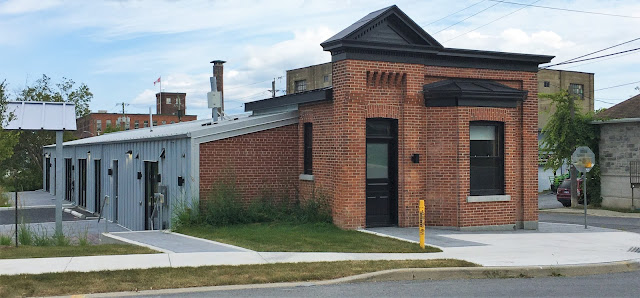ASSESSMENT OF BROWNFIELD REMEDIATION AND DEVELOPMENT IN KINGSTON: BLOCK D AS A CASE STUDY by Jacquelyn Norris. A thesis submitted in partial fulfillment of the requirements for the degree of Bachelor of Science, Honours Queen‟s University 2008.
"1960s – Used to be two main industries – Canadian shipping yards and Canadian locomotive
company – since mid-1950s fully familiar with both operations
- Involved as a councilor and a member of provincial parliament
- Waterways main method of transportation
- Kingston was going to be the capital of Canada, public limestone buildings built all over
the place
- Never materialized
- Harbour still used for transportation of goods
- Big change in Kingston when decision was made to have the main channel of St. Lawrence
seaway on other side of Wolfe island, need for transportation diminished, transportation
changed, rail, road, etc.
- Industries were terminated (mid-60‟s)
- Bill Teron – influential builder in Ottawa area, bought both sites, convinced council of the
time that he was going to build into a residential developed area, Block D and two blocks
beside, Harbour Place and Shipyards close to marine museum and steam museum.
- Approval where harbor place is and landmark, city of Kingston got the land immediately in
front of city hall, now city park
- Bill Teron makes arrangements with the city, whereby he is going to turn industrial into
residential land use
- Nobody understood the magnitude of developments
- Nobody had seen what 100units/acre meant then
- Became chairman of CMHC, put everything he owned in blind trust, so that accusations
could not be made that the decisions made for CMHC would directly benefit him
- Came on the scene in 1972-3 developers came along that had bought it from Teron, wanted
to make some changes to the original agreements made with council at the time (1960s)
- Utilized the best information that they had, everybody seems to forget about Block D
- Can remember in the 70s, people would not venture past Prince George hotel, derelict area,
homelessness etc.
- Early 1980s landmark and harbor place get built – built as part of separate agreements
negotiated with Teron, the units per acreage is the same as what Teron had originally
negotiated – council was not heavily involved in that process
- Too much development? Concerns at this point
- Block D lay fallow for so many years – blind trust – Maurice Rollins Construction of
Belleville and Sonia Neilson Realty of Kingston, people came up with new proposals for
development – the zoning wasn‟t appropriate for the site
62
- 1981 – tried to buy block D for the City – regrets not purchasing the property, could have
called for a development proposal that would have better integrated public uses along
waterfront with private use on the property
- Put an offer in Neilson-Rollins counter-offered, only about 300-400K difference (1.7m –
2.0m) – turned down on vote
- What is built there is much in line with what the original zoning that Teron got. Some
don‟t like high-rise buildings
- Waterfront belongs to the public, not to anyone individually – as much public access and
ownership of waterfront as possible – there are certain elements of that in Block D,
although the Admiralty place is wonderful – was a square warehouse, built into beautiful
building it is today – probably built in early 1980s – marine museum next to it and then
steam museum associated. "



















